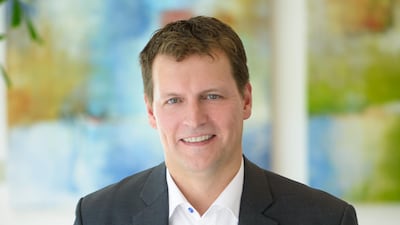California orthodontics company Align Technology, makers of 3D digital scanners and Invisalign, plans to double growth in the Middle East and Africa in the next three years by capitalising on clinics going digital and its small presence in the region.
"Our aim is to double our growth in expansion markets, including Middle East and Africa, by 2021," Simon Beard, Align Technology's vice president and managing director for Europe Middle East and Africa (Emea), told The National, who said the company has less than 10 per cent market penetration.
In its 2017 fiscal year, Middle East sales grew 44 per cent year-on-year, slightly ahead of a wider region that includes Europe which grew 38 per cent, a sign that Align's strategy of tapping newer markets is working, according to the managing director.
The Mea orthodontic supply industry was valued at $340 million this year and is set to grow to $460m by 2023, according to Market Data Forecast, a global research and consulting firm. The Middle East has a total of 440,000 new orthodontics patients per year.
Align Technology, which opened its first regional office in Dubai in February this year, is aiming for robust organic growth in the region.
___________________
Read more:
For 5G to succeed, coverage must take priority over revenue
Emaar Malls CEO: brick-and-mortar retailers unfazed by e-commerce
____________________
Invisalign treatment is a technique that straightens patient’s teeth without braces - using a series of clear, removable aligners that are custom-designed to fit one’s teeth.
According to Align Technology, as many as 100 million patients in the Emea region could benefit from some type of teeth straightening. The company is printing clear aligners using 3D printers. Using the technology, doctors can scan and collect a 3D model of the teeth that is sent to treatment centres and developed into implants for the patient.
“The UAE and Saudi Arabia are key focus markets," said Mr Beard. "Our digital 3D scanner enables doctors to digitalise their practice and products while it helps the patient to visualise how their smile will look.”
This visualisation also works as a powerful sales tool - giving patients a peek into what their future smile will look like after going through the Invisalign treatment.
“In this region, we see a kind of excitement about the potential among people to improve their smiles, particularly in the adult population. Historically, their only option was brackets. But now the treatment is very discreet and easy.”


